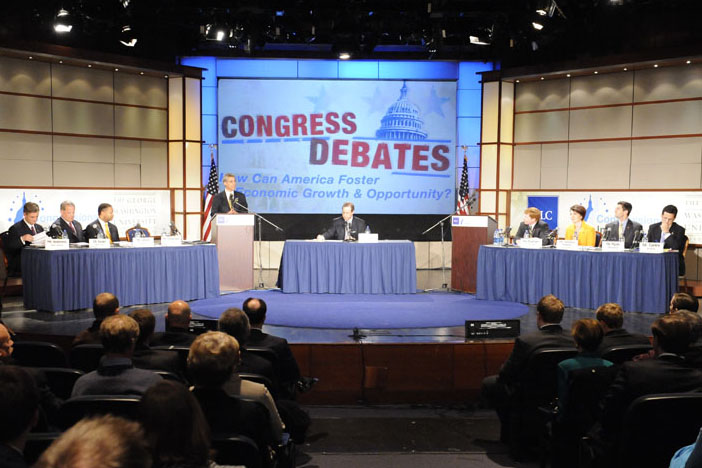Second in Series of Bipartisan Congressional Debates to Focus on Health Care
After Successful Premiere in Washington, “Congress Debates” Continues at Cincinnati Children’s Hospital Medical Center on April 28
WASHINGTON – The House Democratic Caucus and the House Republican Conference, in cooperation with the Cincinnati Children’s Hospital Medical Center, the Democratic Leadership Council, and the Congressional Institute are pleased to announce the second debate in the “Congress Debates” series will be held in Cincinnati, Ohio on April 28. This debate will focus on a subject of great concern to all Americans – health care.
“Congress Debates” is a series of bipartisan debates, launched in February in an effort to foster bipartisan dialogue on the most important issues facing America and to generate substantive discussion that goes beyond sound bites and partisan talking points. “Congress Debates” is an effort to break through the rancor of Washington and return real policy discussion to the debate between the parties.
The second debate in the “Congress Debates” series will be held at 2 p.m.on Monday, April 28 at Cincinnati Children’s. Eight Members of Congress – four Republicans and four Democrats – will debate the state of health care in America and ways it can be made more affordable and accessible.
Participants in the second debate will be: Rep. Xavier Becerra (D-CA), Rep. Marion Berry (D-AR), Rep. Charles Boustany, M.D. (R-LA), Rep. Shelley Moore Capito (R-WV), Rep. Kathy Castor (D-FL), Rep. Nathan Deal (R-GA), Rep. Allyson Schwartz (D-PA), and Rep. John Shadegg (R-AZ).
The debate will be moderated by National Public Radio health policy correspondent and CongressDaily contributing editor Julie Rovner.
“All too often in Washington, partisanship dominates every discussion of every issue. But the challenges facing America – from our struggling economy to tens of millions of people without health care – are tremendous, and they deserve serious discussion and attention from both sides of the aisle without becoming a partisan tit-for-tat,” said Rep. Rahm Emanuel (D-IL), Chairman of the House Democratic Caucus. “These debates enable Republicans and Democrats to discuss our differences without being disagreeable, and our policy differences without being partisan. I look forward to this battle of ideas, not insults.”
“This debate will provide an opportunity for Republicans and Democrats to come together and discuss how best to achieve our shared goal of seeing every American gain access to quality, affordable health care,” said Rep. Adam Putnam (R-FL), Chairman of the House Republican Conference. “Our first debate in Washington was a great success, and with the fine group of lawmakers we have representing both sides in Cincinnati, it is sure to be another spirited discussion.”
“Cincinnati Children’s Hospital Medical Center is honored to host this important discussion about health care policy and the future of the U.S. healthcare system,” said Jim Anderson, president and CEO of Cincinnati Children’s. “If we are to change the outcome for children and adults in our nation, it will be because government, the medical community and the private sector work together toward a common goal to provide quality care that is accessible to all Americans. Events such as this that promote public discussion are an integral part of accomplishing this goal.”
“Too frequently, sensible policy solutions are drowned out by a deafening chorus of partisan bickering,” said Al From, founder and CEO of the DLC. “We hope that this debate series, focusing on policy over partisanship, will foster the kind of frank, substantive discussion that is so often missing in today’s Washington.”
“Congress is at its best when it is debating ideas and solutions,” said Mark Strand, President of the Congressional Institute. “These debates help pull back the partisan curtain so that the public can hear how competing philosophies and principles are applied to the problems and threats facing our country.”
The first debate in the “Congress Debates” series was held February 25 at The George Washington University in Washington, DC and focused on the economy. The Capitol Hill news site Congress Now characterized the debate as “cordial disagreement rather than partisan combat,” and The New York Times suggested “a set of debates that shows lawmakers airing their legitimate differences on issues without coming to blows can only be a good thing.”
For additional information about “Congress Debates,” please contact the House Democratic Caucus, House Republican Conference, the DLC or the Congressional Institute.
